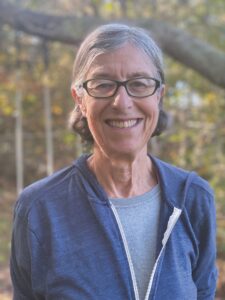TRURO — You might call Lee Swislow a political animal. She has been a longtime advocate for gay rights and was, for nearly a decade, the director of GLAD — the Boston-based equal justice nonprofit GLBTQ Legal Advocates and Defenders.
Since moving to Truro from Cambridge in 2020, she says, she’s been enjoying learning her way into local political affairs. To do that, she has attended climate action committee meetings, a panel on how government works, dept. of public works open houses, and even the citizen police academy.
She’s also been volunteering at Lily House in Wellfleet, where she is now on the organization’s board. Its mission of providing free hospice-level care in a peaceful place “really resonated,” says Swislow.

“It’s very, very different than living in the city,” she says. But while she admits there are some things she misses about political engagement on a larger scale, “there’s also something that’s very nourishing about feeling like I can actually know the people who are involved in various initiatives.”
Swislow says she happened into her career in progressive politics by accident. She went to her first women’s liberation conference when she was an undergraduate at M.I.T. not because she was seeking liberation but because she was searching for a study topic for a class called “Dissent and Reform in Twentieth Century America.”
“I thought, ‘I’ll go there, I’ll get their materials, and I’ll write about how stupid this thing is: women’s liberation,’ ” says Swislow. She was swept into feminism’s second wave upon arrival, stunned, she remembers, not just by speeches venerating female strength but also by the proof that followed, like martial arts demonstrations where women broke boards with their foreheads.
When she got home, she read the dossier of women’s liberation materials she’d picked up at the conference. She got out a garbage bag, she says, and “threw away my makeup, my hair dryer, my curlers, my razor blades, everything.”
Swislow grew up in Park Forest, a suburb south of Chicago. Her parents were quiet Democrats in a Republican neighborhood. They didn’t talk much about politics, though having a Jewish father meant there was a general if unspoken awareness of discrimination, she says. Gender roles were clear: the husbands commuted to work in the city and the wives stayed home with the kids, “and I just couldn’t wait to get out of there,” she says.
Swislow first visited Provincetown when she was 23. She had just come out, she says, and she remembers driving down Commercial Street, disco on the radio, and waving at everyone she passed. It was an early dose of “the same feeling that any queer person has,” she says, that is, “Oh my god, I can be myself.”
Swislow earned a nursing degree after graduating from M.I.T., then joined the Radical Cambridge Hospital Nursing Group and Radical Boston Area Nursing Group.
In 1981, “we started seeing people with this weird pneumonia that no one had heard of before,” Swislow recalls. The patients were young, mostly gay men, and what they were battling was incurable.
Swislow worked treating people with AIDS at Boston City Hospital, then at Cambridge Hospital. She remembers the late 1980s as a time spent reading a harrowing stack of obituaries. Even now, “I can’t even talk about it,” she says.
Years later, when she got a call from GLAD looking for an executive director, Swislow remembers telling her wife, Denise McWilliams, “There’s no way I’m doing that!” But she didn’t delete the voicemail. Lunch with the outgoing director quickly became “love at first sight” between her and GLAD, Swislow says. She took on the leadership job in 2005.
That was a year after Swislow and McWilliams were married and two years after the state Supreme Judicial Court ruled in favor of GLAD and the right to same-sex marriage in Goodridge v. Department of Public Health. The case marked Massachusetts as the first state to legalize gay marriage.
Swislow retired from GLAD in 2014, and she and McWilliams bought a cottage in Truro the next year. But they didn’t move here until Covid hit.
Engaging in civics in Truro entails taking “a deep breath,” Swislow says. In the process, she has developed some stances.
“I’m a big proponent of the Walsh project,” she says. “I even think we could get to that place without, as some people say, ‘changing Truro as we know it.’ ”
Swislow says she loves nature. The house she shares with her wife abuts the National Seashore, where she ambles with her dog. But Swislow believes Truro’s natural world is too often leveraged as a tool against development. She doesn’t think the town has to choose between people or woods.
“I think we need more people, and we need more younger people,” she says.
That conviction is part of what drives her to attend so many municipal meetings. She hopes Truro can be “a place that has farms, a school, a library with year-round programming, a market year-round,” Swislow says. “I want it to be a vibrant small town.”



